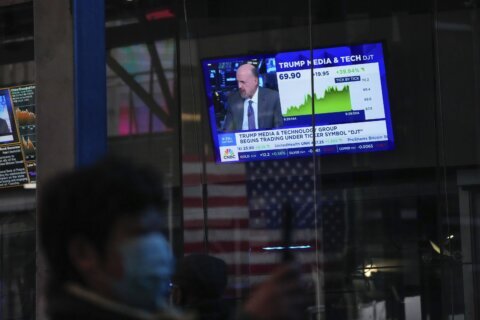The U.S. stock market may have shown strong performance year to date, but the Federal Reserve’s fight to tame high inflation isn’t over yet.
On July 26, the Fed implemented its 11th interest rate hike since March 2022 to bring the federal funds rate to a target range of 5.25% to 5.5%. Along with its intended effect of cooling inflation, the spate of interest rate hikes has also produced a silver lining: boosting the yields on money market funds. Many of these funds are now paying yields of 5% and above, dwarfing comparatively riskier dividend stocks, which helps attract investors looking for safety of principal and present income.
“Money market mutual funds are great investments for short-term, conservative investors,” says Nafis Smith, principal and head of taxable money markets at Vanguard. “This is because they typically invest in very liquid securities with the objective of preserving your capital while also providing income at prevailing market rates.”
[Sign up for stock news with our Invested newsletter.]
By holding a variety of liquid, high-quality fixed-income securities such as Treasury bills, certificates of deposit, repurchase agreements and commercial paper, money market funds aim to limit both credit risk and interest rate sensitivity. This helps them maintain a stable net asset value, or NAV, per share of $1, which limits volatility for investors.
These funds are not entirely risk-free. Unlike bank savings products such as high-yield savings accounts or certificates of deposit, money market funds do not benefit from Federal Deposit Insurance Corp., or FDIC, protection. In extremely turbulent market conditions, they also run the risk of losing principal.
“Investors should understand the share prices of money market funds can dip below their NAV per share of $1 and have historically done so a few times during extremely volatile markets,” says Smith. When this occurs, a money market fund is said to have “broken the buck.”
Still, money market funds are considered low-risk investments, suitable for conservative investors who prioritize protecting their money while earning income that moves in lockstep with prevailing interest rates.
“Money market funds can be a great way to save for short-term goals, like buying a car, a down payment or building your emergency savings,” says Sophoan Prak, a certified financial planner and financial advisor at Vanguard. “Generally, if you have a planned expense within one year, a money market fund can be a good investment option for it.”
Here’s a look at seven of the best money market funds to buy in 2023:
| Money market fund | Expense ratio | 7-day yield as of Sept. 22 |
| Fidelity Money Market Fund (ticker: SPRXX) | 0.42% | 5.1%* |
| Fidelity Treasury Money Market Fund (FZFXX) | 0.42% | 5%* |
| Schwab Value Advantage Money Fund — Investor Shares (SWVXX) | 0.34% | 5.2% |
| Schwab U.S. Treasury Money Fund — Investor Shares (SNSXX) | 0.34% | 5.1% |
| Vanguard Federal Money Market Fund (VMFXX) | 0.11% | 5.3% |
| Vanguard Municipal Money Market Fund (VMSXX) | 0.15% | 3.8% |
| Vanguard Treasury Money Market Fund (VUSXX) | 0.09% | 5.2% |
*Denotes 7-day yield as of Sept. 24.
Fidelity Money Market Fund (SPRXX)
SPRXX is a straightforward and long-standing money market fund pick from Fidelity. With an inception date of January 1989, this fund has survived numerous market events, including the dot-com bubble and the Great Recession. Right now, the fund holds a mixed portfolio consisting of Treasury repurchase agreements, government agency repurchase agreements, certificates of deposit and more.
With net assets of about $9.2 billion, SPRXX is well capitalized and popular. On Fidelity’s platform, this fund charges no transaction fees. Moreover, it does not charge a minimum investment, making it very accessible. Currently, SPRXX is paying a seven-day yield of 5.1%. However, it does charge a fairly high 0.42% expense ratio.
Fidelity Treasury Money Market Fund (FZFXX)
Investors looking to maximize quality and reduce credit risk with their money market fund can opt for FZFXX instead of SPRXX. This money market fund only holds short-term U.S. Treasury securities, which include Treasury bills, coupons and repurchase agreements. FZFXX also costs the same 0.42% expense ratio, and there is no minimum investment required.
In terms of income potential, FZFXX pays roughly the same seven-day yield as SPRXX at 5%, rounded up. The yield is slightly lower due to the lack of commercial paper and corporate debt in FZFXX. The difference can be seen between the total returns of both funds, with SPRXX sporting a higher 10-year annualized return of 1% compared to FZFXX at 0.85%.
Schwab Value Advantage Money Fund — Investor Shares (SWVXX)
Investors on Charles Schwab’s brokerage platform can make use of SWVXX, which does not require a minimum investment and carries a lower net expense ratio of 0.34%. As a “prime money market fund,” SWVXX is able to diversify beyond Treasurys and repurchase notes into additional high-quality, liquid fixed-income assets such as commercial paper, time deposits, bank notes and certificates of deposit.
Currently, SWVXX pays a seven-day yield of 5.2%. Over the past 10 years up until Aug. 31, the fund has returned an annualized 1%. SWVXX is also very popular, with over $148 billion in assets under management, or AUM, with steady inflows of capital recorded. The fund also offers a high percentage of daily liquid assets, which is a measure of its ability to meet potential shareholder redemptions.
Schwab U.S. Treasury Money Fund — Investor Shares (SNSXX)
SNSXX is the Treasury-only counterpart to SWVXX. As a government money market fund, SNSXX only invests in fixed income securities that are backed by the full faith and credit of the U.S. government, such as Treasury bills and repurchase agreements. This gives the fund a lower risk of default.
Compared to SWVXX, SNSXX is less popular, with over $19 billion in AUM, a smaller but still highly respectable amount. The fund has much greater liquidity, though, with daily liquid assets sitting at 100%, meaning that shareholders’ redemptions have no problems being met. It also charges a 0.34% expense ratio and comes with no minimum required investment.
[READ: What’s the Best Treasury ETF? 7 Options for Investors]
Vanguard Federal Money Market Fund (VMFXX)
Vanguard funds are built on a philosophy of low fees. A great example in its money market category is VMFXX, which charges a 0.11% expense ratio, a third of what SWVXX charges. “VMFXX invests mainly in high-quality and short-term government securities,” says Prak. Right now, this includes repurchase agreements and other government obligations.
“I like VMFXX for its low fees versus many other money market funds that not only have lower yields, but also higher expense ratios,” says Michael Ashley Schulman, partner and chief investment officer at Running Point Capital Advisors. By keeping fees low, VMFXX is able to keep net income potential higher, with a current seven-day yield of 5.3%. However, the fund does require a $3,000 minimum investment.
Vanguard Municipal Money Market Fund (VMSXX)
Investors holding money market funds in a taxable brokerage account may experience significant drags on their income due to taxation. Outside of a tax-sheltered account like a 401(k), Roth IRA or health savings account, taxes can quickly eat into the yields paid by a money market fund. The solution here is a fund like VMSXX, which holds tax-exempt fixed-income investments issued by municipalities.
“One of the benefits of investing in VMSXX is receiving federally tax-exempt interest income,” Prak says. This feature makes the fund attractive for high-income-bracket investors who have maxed out their tax-sheltered accounts. Currently, VMSXX pays a seven-day SEC yield of 3.8%, while charging a 0.15% expense ratio. The fund also requires a $3,000 minimum initial investment.
Vanguard Treasury Money Market Fund (VUSXX)
Finally, Vanguard also offers a government money market fund in the form of VUSXX. Unlike VMFXX, this fund also holds Treasury bills in addition to the usual repurchase agreements and government obligations. The result is a higher credit quality, and the same seven-day SEC yield of 5.2%. According to Vanguard, it is “considered one of the most conservative investment options offered.”
Because the fund is largely composed of Treasury bills, the expected yield will fluctuate based on the current interest rate environment. This can be positive during a time of rising rates, but negative when rates fall, as the yield will follow suit. Unlike bonds, though, VUSXX will not gain value when rates are cut, as its NAV is designed to remain stable at $1. The fund charges a 0.09% expense ratio.
More from U.S. News
7 Best Money Market Funds to Buy for Safety
5 Great Fixed-Income Funds to Buy Now
The Best Vanguard Money Market Funds
7 Best Money Market Funds for 2023 originally appeared on usnews.com
Update 09/25/23: This story was previously published at an earlier date and has been updated with new information.







